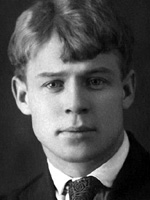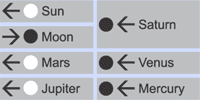Interesting facts
The theorist (The Black Mercury, The White (Gray) Jupiter)
Sergei Yesenin was not only a poet but also a theorist of art. He headed the imagists (a new freethinking stream of the poetry), declaimed a lot of poetry and poetic declarations, edited, read a lot, wrote clever, brilliant in style articles. Yesenin analyzes current processes and trends in poetry and literature with deep interest, attempting to influence their development by establishing the school of imagism.
Later, however, the poet felt the difference with the philosophy of the imagist and announced about his resignation. "I think that a poet cannot keep to any particular school. It hog-ties. Only a free artist can bring a free word", writes Yesenin in his autobiography. "In my poetry a reader should mainly pay attention to the feeling and the lyrical imagery, which pointed the way to many young poets and fiction writers. I did not invent this image, it was and it is the foundation of the Russian spirit and eye, but I was the first who developed it and put as a cornerstone to my poems. It lives in me organically as well as my passion and feelings. This is my peculiarity, and this can be learned from me as much as I can learn something from other people".
The love and the marriage (The White Sun, The Black Venus)
During his short life, Yesenin, in addition to countless mistresses, had four marriages, one civil (with Anna Izryadnova) and three official (Zinaida Reich, Isadora Duncan and Sofya Tolstaya). Family relationships quickly bored the poet, becoming a burden, which fettered and oppressed him. Tearing one relationship, eager to experience and easily enamored Yesenin started new ones soon in which again there was coming the inevitable moment of exhaustion, frustration, leading to the next break.
But, in spite of everything, he was loved by everybody and always in different representations - a violent, drunken and hangover, tender and a boor. There were a lot of women who loved him, but there was little love in his life. Yesenin himself explained it this way: "No matter how much I swore someone in mad love, no matter how hard I assure the same to myself - all this, in fact, is a huge and fatal mistake. There is something that I love more than all women, and I wouldn’t give it up for any affection and love. This is the art..."
The home tyrant (The Black Mercury)
In everyday life and in love Yesenin was, to put it mildly, not easy. He made the real bashing, destroyed the furniture, beat the dishes, fought and sometimes was becoming insane and out of control. The poet was jealous. After drinking, he was becoming unbearable, arranging his pregnant wife (Zinaida Reich) ugly scandals. He loved in Russian way: first he beat, and then he laid in the legs, begging for the forgiveness. Such behavior later repeated in relations with his second official wife, Isadora Duncan.
The alcohol dependence (The Black Moon)
"My friend, my friend,
I am very, very ill.
I don’t know where comes this pain from.
Whether the wind whistles
Over the empty and deserted field,
Or like a grove in September,
Showers the brain alcohol".
Esenin’s poem "The Black Man"
Isadora Duncan saw that her beloved looses himself into drinking, and to save him she decided to take him abroad. In May 1922, Yesenin and Duncan registered their marriage and went to Europe firstly and then to America. But he became a husband of Duncan instead of a great poet there. He was angry, drank, unfaithful, he was beating her and then repented and declared his love because of this. Isadora’s friends were horrified by her family life: "How do you let him treat you this way?! You are a great ballet dancer!" Isadora was offering excuses: "He is sick. I cannot leave him. It's like to give up on a sick child".
The master (The White Mars)
Yesenin was talking about the poets and versemakers this way: "All they think in such manner: here is the rhyme, the image, and it’s as good as done: you are the master. It’s a pig’s eye you are the master... You should try to smile in the verse, remove the hat and sit down; that's when you become the master!" He himself could not only "smile in the verse"... Yesenin was a true national poet. You can hardly find people indifferent to his work. The poetic language of Yesenin with all its aesthetic and emotional intensity is surprisingly easy to understand. Simplicity and perfection of the form helps the reader to see the world through the eyes of a poet and feel the subtlety of his experiences. The musicality that pervades the works of Yesenin, never ceases to inspire the composers, turning many of his poems into popular songs.
Yesenin himself repeatedly addressed the audience with his works, hitting the audience with frantic, violent and loud manner of reading. At the same time the spout of the poetry was accompanied by very expressive gestures, which gave his poems more expressive force. Sometimes Yesenin imitated Block and Bely. Blok's poems he read seriously and with respect, and the poetry of Bely - mockingly, imitating his manner of reciting the poetry.
Yesenin and Mayakovsky (The Black Saturn)
A lot of men of pen and ink from the circle of Mayakovsky stressed Yesenin’s negative attitude towards the poet. Victor B. Shklovsky, for example, asserted about Yesenin the following: "He did not like Mayakovsky and tore his books if he found them in his house". Vsevolod A. Rochdestvensky called the relationships of Mayakovsky and Yesenin “strange”: "They were tied tight with never ceasing dislike. Yesenin was a doubtless "lyrical evil" for Mayakovsky. He, never separating him from enthusiastic, excessively sensitive audience, argued with Yesenin and the audience, ironically spoke about Yesenin's poetic device. Short-tempered and extremely touchy Yesenin could never forgive him this". And this is the evidence of the proletarian poet N. Poletaev "Yesenin did not bear the rivals, even the recognized ones. Once at a banquet at the House of print, I think on the New Year’s Eve, having drunk, he molested Mayakovsky and almost crying shouted him "Russia is mine, you know – mine, and you're... you're American! Russia is mine!" Restrained Mayakovsky ironically replied to this: "Take it, please! Eat it with bread!"

